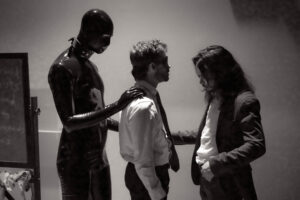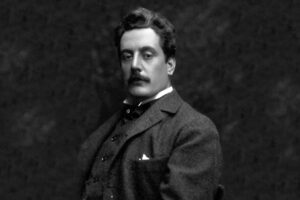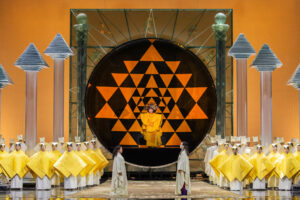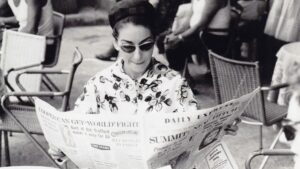

Fabio Luisi, whose lickety-split Ringrather annoyed me, does not seem in such a rush with Troyens. The Met Orchestra breathes with Berlioz’s melodies and artfully stumbling rhythms.
The ballets are a bit much, but that’s the composer’s fault—over the decades, I’ve come to enjoy them as music, and Doug Varone’s new choreography is no more embarrassing than the dances in any previous version. The tearing of Laocoön and his sons to pieces by serpents, enacted like volleyball upon the upraised hands of dancers and chorus, was lively if not classically smooth. The bouncing of ships on the sunlit harbor of Carthage after the intermission was charming, and I liked the hornpipe of the matelots.
The greatest improvement in Francesca Zambello’s production (new ten years ago—the Met gives this opera every ten years, regular as carved Mayan clockwork), thanks, says The New York Times, to malfunctive stage machinery, is the total elimination of the two dancers twirling in mid-air in “sexual ecstasy,” doubling for Dido and Aeneas. Blame the stage if you like, but their loss is a win by any standard of taste.

The wooden backdrop is configured as a vast U with many crevices, so that the colors of fiery city, blazing mid-day, romantic sunset and bitter dawn subtly flood the entire stage. A central focal circle of interlocking sticks evolves, in the course of the epic, into the oculus of Rome’s coffered Pantheon ceiling. That may seem off the subject till you remember that the Met’s original production of Troyens concluded with three tacky mock-ups of the Roman she-wolf nursing Romulus and Remus.
Zambello’s stage is on turntables, allowing the amorous duet of Dido and Aeneas to become an orgy without ungainly entrances and exits. There is, if anything, always too much activity in this production, as if Zambello cannot keep her busy mental energies still at those moments (Aeneas’s troubled sleep before the appearance of Hector’s Ghost, the meditative pause between Royal Hunt and Dido’s party) when Berlioz wanted us to calm down and relax before the next hullaballoo. Zambello cannot relax. Les Troyens is a busy night.
So it’s a spectacular event, the production more than passable, the orchestra in good hands, the chorus absolutely tip-top (they seem to love this opera, that asks so much of them), even the costumes (by Anita Yavich) tasteful and attractove if sometimes severe, in hues of gold, Pompeiian red, Tunisian white and Tyrian purple. Why, then, do I advise you to skip the opening acts and arrive at the intermission?

She’s a grand, archaic conception, a contrast to the (deluded) joys of nearly all the others and, at the end of the act, she flourishes a dagger to cry, “I told you so!” to her grateful people. (I translate loosely.) Every dramatist who turns to this story (Aeschylus, Shakespeare, Anouilh, Saki) has a merry time with her.
But the fly in the flan is that Cassandra must vocally hold her own. Shirley Verrett was a gaunt shadow, Jessye Norman an empress uncrowned. Tatiana Troyanos withdrew from her scheduled performances of the role in justified alarm. At the Met this time, the role goes to Deborah Voigt. Voigt acquitted herself decently in the part ten years ago, before her operation. (And I warned her!)
Her voice now is dull, utterly without its erstwhile glow or size or color. Her unattractive amble through the part saps the energy right out of the performance. She hits the notes, but who cares? She is unable to put attractive force behind any of the seer’s raging utterance. We don’t care who she is or what she’s singing about. Everything Voigt touches turns to lead, lifeless, bare of music.
Dwayne Croft’s able Coroebus proves unable to lure her to a happier attitude. David Crawford Walker is distinguished as the Ghost of Hector, though he isn’t aided by Zambello’s “staging” of the measures Berlioz wrote to depict Aeneas’ uneasy dreams: They have become scenes of rapine and pillage in the streets of Troy.

Let’s focus on Dido for a moment. From Ludwig and Troyanos, I was accustomed to think of Dido as, primarily, a sensuous role, coiled passion awaiting the spring set off by the son of Venus. But this is not the only way of singing it. Lorraine Hunt Lieberson, who might have had trouble filling the house with declamation, sang Dido with the precise, molded syllables of a chansonnière; she made the huge Met into a chamber just her size. Each phrase of Dido’s, from gracious queen to wistful widow to exultant lover to desperate, heartbroken woman was scaled to Hunt’s instrument, and the house seemed to shrink to suit her.
Graham has a larger natural voice, and it retains its beauty at full power (blast is not the word at all). Her very expertise at deployment has sometimes led me to underestimate her dramatic commitment, to find a lack of sensuous urgency there. But lately she’s been singing Gluck (Iphigénie en Tauride), and singing Gluck’s restrained declamation is the very best way to prepare yourself for Berlioz and the mingling of that restraint with grand opera force for Les Troyens. (Has Graham ever sung Gluck’s Alceste? And if not—somebody stage it for her, now.)
This is not Graham’s first attempt at Didon—they still talk about (and own the DVD of) the Dido she sang opposite Antonacci’s Cassandra at the Châtelet ten years ago—and she sings her Dido, not Hunt Lieberson’s or Troyanos’s. Her natural sound is a bright one, and she feels at home in happier scenes, but the sorrowful ones were understatedly moving, with a despairing sigh in the lines of farewell.

He managed the role with creditable effort, but the outrageous high C in Act V (a reef that nearly sank Vickers and Domingo, and completely cracked for Heppner) took him drastically into head voice, which is not a stratagem that modern audiences accept kindly.
There was so much good singing in the rest of “Les Troyens á Carthage” that one could overlook a betîse of this sort. Friends in Britain tell me Scottish Susan Karen Cargill is called “Cowgirl” over yonder; here, she sang Dido’s sister, Anna, with a full, luscious chest voice, sizable and creamy, and some flirtatious not-quite-whispers for her sisterly plots. They like her Annie, Get Your Gun over there; I’d like to hear her take on Dalila or Ulrica over here.
Eric Cutler’s Iopas seemed to me a little less flowing and intense than the last go-round, but the voice has also gotten bigger—will he be the next Aeneas? I’d be interested in hearing him essay some of that. Paul Appleby sang the homesick Hylas; he lacks the willowy figure for the role, but his singing drew happy applause. Richard Bernstein as Panthus, evidently directed to be ever more upset with the way Aeneas’ fraternizing is proceeding, was a proper, salty presence to push the crew along.
Julie Boulianne sang Ascanius, a role Zambello cannot leave alone: Last time, the boy was directed to whine and fret during his father’s flirtation; this time, he tried to pick up a dancing girl of his own. Neither action suits Virgil’s story; I suggest Zambello go there (as Berlioz always did) when she is strapped for an idea.
Kwangchoul Youn, the Narbal, was Panthus’ counterpart, expecting disaster from the moment the Trojans arrived. The foreboding of the two men meant we were less surprised when things went wrong—but we do know that Aeneas left Dido to found Rome. Any additional surprise is a dramatic plus.
Paul Corona and James Courtney sang the Two Soldiers well, though directed to be so busy messing up their women that the humor of their dialogue passed us by.
The chorus, under Donald Palumbo, sang like a dream—or did I mention that?
I’ve been waiting all season, no, ten years for this opera to return. I may go again, but I’ll certainly skip the first section this time.
Photos: Cory Weaver/Metropolitan Opera

























Comments